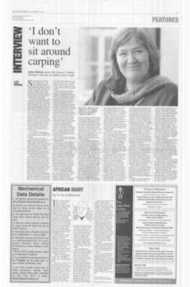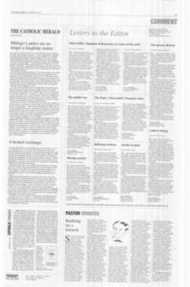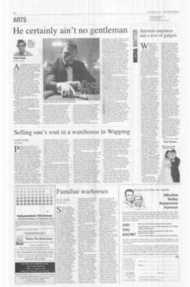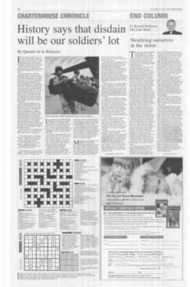Page 9, 24th November 2006
Page 9

Report an error
Noticed an error on this page?If you've noticed an error in this article please click here to report it.
Tags
Share
Related articles
Catholic Pupil Resists School's Demand To Remove Tiny...
Polish Influx Halts Mergers Of London Catholic Churches
Belgian Cardinal Launches Evangelisation Drive
Cardinal Unveils Blueprint For Spiritual Renewal
Nichols Presses Newman's Cause
`Why aren't you wearing a crucifix?'
Catholics should bear greater public witness to their faith, says
Fr Michael O'Boy. Christina Farrell has a friendly, but fiery encounter with the new head of Westminster diocese's evangelisation unit Wwen Fr Michael O'Boy discovered that the Cardinal as appointing him as head of the diocese's new evangelisation unit he didn't sleep for three days. "I was very excited," he says.
We are sat in his executive office on the ground floor of Vaughan House, a wing and a prayer from Westminster Cathedral where for many years Fr O'Boy was the sub-administrator.
He was, of course, number two to the urbane Mgr Mark Langham and you can't help feeling that Fr O'Boy is pleased to have his own remit, at last. They were known, affectionately, as Dick Dastardly and Muttley (the cartoon heroes of Whacky Races) and there is certainly a youthful exuberance about the new director. Fr O'Boy has a swanky office and a new catechetical team. He sits with his back to the door and swings round in his chair when I walk in. He's so enthusiastic, you really want him to succeed.
The offices are not very churchy: no oak-panelled walls, no whiff of incense and you're more likely to hear the whirr of an Apple Mac than the swish of a soutane. On the way over to Victoria I got caught in the type of tropical storm that usually batters the colonies and I'm soaked, stockinged feet slipping out of heels. I ask if I can have a cup of tea, more to recover composure than anything else, and I'm handed a mug with hearts on. The new intern from the Public Affairs Office is also in the room. I drip on to the carpet. She crosses-her arms.
Fr O'Boy starts by saying lots of positive things about evangelisation. Westminster is on a bit of a roll at the moment from the success of At Your Word, Lord, a faith renewal programme launched by Cardinal Cormac MurphyO'Connor in 2003. The take-up was Pratt)' impressive and small faith communities, as they am called. sprang up in parishes from Hertfordshire to Hackney.
Buoyed with success, the new evangelisation unit is seeking to help people deepen their understanding of faith. Its new programme, "God is Love", is already up and running and combines the daily office with spiritual reflections, and extracts from the Catechism and Pope Benedict's first encyclical Deus Caritas Est. So, stamping down on heresy then?
Fr O'Boy gives me a withering look. 'The agency's principal job is to give people a sense of confidence and help them have some credibility," he says. "How well do we know our faith?"
This is revelatory. Westminster seems to be acknowledging what Pm Ecclesia and other groups have been telling us for years.. that we have lost an understanding of faith, a respect for the Sacraments and need to go back to basics.
Fr O'Boy starts again; "There is a gap. There has been a gap in the teaching and transmission of the faith to the younger generation."
We are of similar age and I know he went through the same turgid liturgy of the 70s that marked most of my Sundays. The teaching of the t'aith was also pretty negligible because a generation of "enlightened" lay advisers were busy telling priests what to do. We were subjected to "faithworks" workshops rather than Benediction. My heart still sinks when I get a booklet with a 70s cover— loaves and fishes, that sort of thing.
If this is all about strengthening faith will he he clamping down on enneagram courses in the diocese, I ask brightly? Fr O'Boy puts his hands up and groans. "Honestly, I don't know anything about the enneagram. We are just asking people to take a pro-active role in the life of their parishes."
I try and steer him back to the need to reeducate the laity. This sounds like an admission that the hierarchy in England and Wales has got it wrong for the last 30 years. He replies cautiously: "I wouldn't want to be overly critical of what went before. I hope to give people a confidence and help us, as a country, to raise the issue of faith for others. How do I witness to my faith where I work and where I live? What role does faith play in my life?"
It's easy to be critical but how does not replacing a parish priest in an inner-city parish — St Joseph's, Bunhill Row, for example — equate with enabling people to bear public witness to their faith?
Fr O'Boy hits back. "People have the availability of other Masses in the City: John Paul D emphasised that to be an evangeliser you first have to be evangelised.
"Let's look at our parishes and evaluate what we do in terms of our missionary mandate. Grace and vocation are central to our mission as a Church."
Granted. However, yet again, this does seem to be Westminster preaching to the converted. The same people who volunteer to help in church. who joined At Your Word, Lord, are the target market for "God is Love". What happens to everybody else? "The small communities are not an end in themselves. They give people a sense of belonging," he says. "They deepen the quality of people's experience of parochial life.
In post-Reformation parishes small communities were, it seems, an integral part of community life and helped England to retain some last vestige of faith. Fr O'Boy's doctorate was on post-Reformation communities in Essex, his home county. is he comparing secular Britain with penal times?
"It's a different context, clearly, but the phenomenon of deepening faith in small communities is as old as the hills. We are accessing a wisdom that we have always had."
So, what's wrong with the old-fashioned idea of a parish mission? "There's nothing wrong with it. We're not saying we jettison anything else but we add to it and develop it. The small Christian communities represent something that is established."
The need for a more structured approach to faith, with a greater emphasis on exegesis, certainly developed as a result of At Your Word, Lord. Feedback suggested that people wanted, not just a deeper spiritual experience, but the opportunity to learn more about Catholicism.
Fr O'Boy agrees. "At Your. Word, Lord was a fantastic opportunity for the diocese, but these weren't teaching groups. What we are trying to achieve now is an attempt to redress the balance and to answer the questions that people have."
He continues: "The Church has always had one faith and every generation has to fmd the means of putting that truth across. The pace of change for our generation has been quite radical but prayer remains at the heart of what we do and believe."
He pauses and it's as if he's suddenly bored of the Church-speak. "It's not my work," he explains. "It's the work of the Holy Spirit."
It was certainly revelatory — and professionally astute — to include Deus Caritas Est in the new programme. "For something to be loving it has to be rooted in Christ," says Fr O'Boy.1 agree, so why not kicicstart the faithful with Adoration of the Blessed Sacrament.
"I'm not against Exposition," he starts. "There are already lots of movements which do pursue that. We just owe people a proper grounding in their faith."
The problem is that every time a priest tells the faithful it's time to get involved that's usually a precursor to parish closure or amalgamation. Yet Fr O'Boy strongly denies an ulterior motive and insists that any talk of parish reorganisation in Westminster really is on holdnow because of the influx of Catholic, predominantly Polish, immigrants in the last two years. The demographic profile of the diocese has changed dramatically
"This is not congregationalism," he says. "We're simply deepening Catholic widerstanding." But surely he can't deny that there's a certain amount of number crunching going on here. We don't have enough clergy and the priests we have are increasingly elderly.
"We have enough priests," he proclaims. "In terms of priests per head of population we are very well off in the diocese. We are simply encouraging people to play a greater part in their community." Fr O'Boy sits back in his chair and beams at me.
I think of priests who are run ragged trying to cope alone in parishes where previously there would have been a housekeeper and three or four curates.
Comparisons with rural Africa really don't work in central London when many
priests are not only trying to be good pastors but also dealing with the waifs and strays from various "care in the community" schemes, plus the bureaucracy of local government.
But Fr O'Boy has a vision. "Putting someone in touch with Christianity is also putting them in touch with who they are," he says. "lf you need to find yourself, then you must be rooted in Christ."
He turns interrogator. "When did you last start a restaurant meal with grace or make the sign of the cross in public? Why aren't you wearing a crucifix? Think about the Christmas cards that you send. How are you resisting faith?"
I'm sorry, but telling the laity to go out and bear public witness to the faith weeks after the bishops have junked three Holy Days of Obligation is a bit rum. Fr O'Boy corrects me, as I knew he would.
"We haven't got rid of them. We've moved them to Sunday."
Great, I respond. Go to St Mary Moorfields in the City of London on a midweek Holy Day and watch the hundreds of men and women bearing witness to their faith, demonstrating their Christian commitment in a very public way. Now we're on the subject, didn't senior Westminster clergy criticise the decision to move the Ascension, Epiphany and Corpus Christi to the nearest Sunday as it disrupted the liturgical cycle, interrupting the readings?
Fr O'Boy has a gleam in his eye."Ah ha, but a minute ago you were telling me that priests are overworked and this is a way of helping priests cope in busy parishes." Plus, he adds, "they've done it in America".
I confess, I snarl back that just because the American bishops say jump doesn't mean we have to and Holy Days were especially important for schools when so many Catholic children simply don't go to church on Sundays.
We have reached an impasse. Fr O'Boy looks implacable. The Westminster intern, who has sat in on our meeting, adding to the sense of scrutiny, unfolds her aims. I tell Fr O'Boy that my At Your Word, Lord group still meets and yes, we will be following the God is Love series. Fr O'Boy's enthusiasm remains, despite our spat.
"There's a sense in which we have to reclaim a distinctiveness for ourselves," he says. "At the end of the day we do believe that Christianity is the source of life." ;So, evangelising will extend to people of other faiths and not just the lumpen secular majority? 'In all ways we have a profound respect for the people we encounter," he replies. Is that Church-speak for "yes"?
in the nicest possible evangelistic way, of course.
blog comments powered by Disqus

















